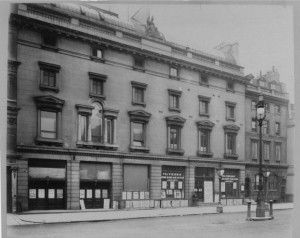Pound at the Poly: A Chronology

A very successful one-day colloquium at 309 Regent Street celebrating the centenary of Ezra Pound’s lectures at the Regent Street Polytechnic on Friday 4th, with presentations from Massimo Bacigalupo, Walter Baumann, Becky Beasley, Helen Carr, Nick Selby and biographer David Moody, in front of an audience also including Ian Bell and Peter Brooker, among many others.
As an addendum to the day’s events, here’s a chronology of Pound’s involvement with the old Polytechnic:
1908
Pound arrives in London via Venice. In the same year the Polytechnic organises the opening and closing ceremonies for the London Olympics, which close that October.
In a letter to his father, Pound reports that he has secured his first proper paid employment in the metropolis: a contract to teach a small series of lectures in January and February 1909 at the Regent Street Polytechnic, via a friend of his Philadelphia travel agent who knew a man at Covent Garden who knew a man at the Polytechnic.
Just before the series of lectures themselves commence, Pound has the book A Quinzaine for This Yule produced by Pollock & Co., the printers used by the Polytechnic for their own course material.

1909
The first series of lectures take place on Thursday afternoons at 5 o’clock, starting on January 21st 1909 and hosted in the Marlborough Room. The title is ‘A Short Introductory Course on the Development of Literature in Southern Europe’. The full course of six lectures – including ones on the Troubadours and on Latin Lyrists of the Renaissance – costs 7 shillings and 6 pence.
Proud enough of the engagement to describe himself in a 1909 resumé as ‘Troubadour … Fellow in Romanics … [and] Lecturer to Regent St. Polytechnic’, Pound’s second series – this time of 21 weekly lectures on Monday evenings at 8.30pm – begin in October 1909 (the same month that Exultations is published).
Although best known by the beginning of the 20th century for its courses in technical instruction, the very fact of Pound’s lectures there demonstrates the breadth of public education then being provided by the Polytechnic and of the audience with which it engaged. As Hugh Kenner points out in The Pound Era, the original ‘registrants’ for Pound’s courses at the Polytechnic – who included Olivia and (his future wife) Dorothy Shakespeare – were ‘not academic folk as we now understand them’, but a certain literary public that (or, so Kenner suggests) began to ‘collapse’ soon after this moment
1910
The lectures, which finish in March 1910, are effectively collected together to make up the book The Spirit of Romance – Pound’s first full-length work of criticism – published in June 1910.
Towards the end of 1910, the original building at 309 Regent Street begins to be demolished – retaining the theatre, swimming pool and gymnasium – to be reopened again by George V in 1912.
Tagged as Ezra Pound, Literature, Modernism


The Institute for Modern and Contemporary Culture
University of Westminster Department of English, Linguistics and Cultural Studies
32-38 Wells Street, London W1T 3UW. United Kingdom.

No comments yet
Leave a comment